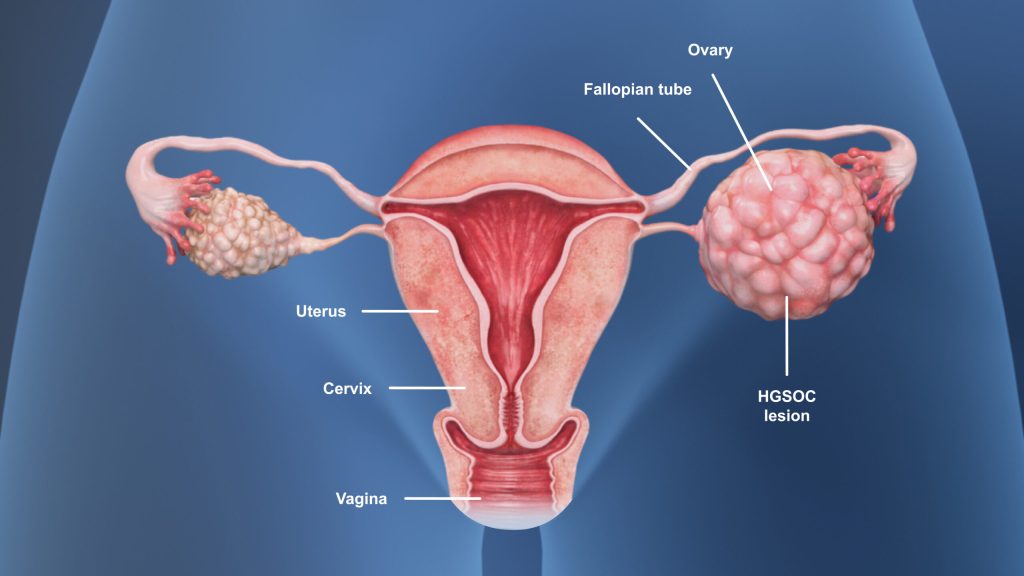Ovarian cancer, often referred to as the “silent killer,” is a malignancy originating in the ovaries. Despite its reputation for subtlety, early-stage ovarian cancer does present identifiable symptoms. Recognizing these signs is crucial for prompt diagnosis and treatment, which can significantly improve survival rates.
Understanding Ovarian Cancer
Ovarian cancer occurs when cells in the ovaries develop malignant tumors. Historically, it’s been challenging to detect in its early stages due to subtle or easily misattributed symptoms. While it’s more prevalent in post-menopausal women, increasing cases are reported in younger women, particularly those in their 30s and 40s. Regular medical check-ups and awareness of bodily changes are essential for early detection.

Key Symptoms to Watch For
- Persistent Bloating
Regular and prolonged bloating, especially when it persists for more than three weeks, can be an early indicator of ovarian cancer. This bloating is often due to fluid accumulation or the presence of a growing tumor in the abdominal cavity. Unlike typical bloating that fluctuates, cancer-related bloating is consistent and progressive. - Lower Abdominal and Pelvic Pain
Experiencing pain in the lower abdomen or pelvic region that isn’t associated with menstrual cycles and lasts beyond three weeks should raise concern. This discomfort may result from tumor growth exerting pressure on surrounding tissues and organs. It’s essential not to dismiss such pain, especially if it’s a new sensation or differs from usual menstrual cramps. - Difficulty Eating or Feeling Full Quickly
A noticeable decrease in appetite or feeling satiated after consuming only a small amount of food can be symptomatic of ovarian cancer. This occurs because a tumor can press against the stomach and intestines, leading to a sensation of fullness. Persistent changes in eating habits warrant medical evaluation. - Increased Urination Frequency
An increased need to urinate, especially if it arises suddenly and isn’t linked to increased fluid intake or infections, can be a sign of ovarian cancer. Tumors can press on the bladder, reducing its capacity and causing frequent urination. Monitoring and reporting such changes to a healthcare provider is crucial.
Challenges in Diagnosis
One of the significant hurdles in diagnosing ovarian cancer is the overlap of its symptoms with other common conditions, such as irritable bowel syndrome (IBS) or urinary tract infections. This similarity often leads to misdiagnosis or delayed diagnosis. Moreover, there isn’t a single reliable screening test for ovarian cancer. Procedures like Pap smears don’t detect it, and even CA125 blood tests can yield false negatives. Therefore, being vigilant about persistent and unusual symptoms is vital.
Risk Factors
Several factors can increase the risk of developing ovarian cancer:
- Age: Women over 50, particularly those who have undergone menopause, are at a higher risk.
- Genetics: Mutations in genes such as BRCA1 and BRCA2 significantly elevate the risk. A family history of ovarian or breast cancer also contributes to increased susceptibility.
- Reproductive History: Women who haven’t had children or those who had their first child after the age of 35 may face a higher risk.
- Hormone Replacement Therapy (HRT): Long-term use of HRT, especially when not closely monitored, can elevate the risk.
- Lifestyle Factors: Obesity, smoking, and a diet high in processed foods have been linked to an increased risk of ovarian cancer.

Preventive Measures
While it’s impossible to eliminate the risk entirely, certain measures can help reduce the likelihood of developing ovarian cancer:
- Regular Medical Check-ups: Routine pelvic examinations can aid in early detection.
- Awareness of Family History: Understanding and discussing your family’s medical history with a healthcare provider can guide decisions about genetic testing and preventive strategies.
- Healthy Lifestyle: Maintaining a balanced diet, engaging in regular physical activity, and avoiding smoking can contribute to overall health and potentially reduce cancer risk.
- Contraceptive Use: Some studies suggest that the use of oral contraceptives may lower the risk of ovarian cancer. However, this should be discussed with a healthcare provider to weigh the benefits and risks.
Advancements in Research
Ongoing research aims to improve early detection and treatment of ovarian cancer. For instance, scientists at the University of Oxford are developing OvarianVax, a vaccine designed to train the immune system to prevent ovarian cancer. While still in the experimental stages, such advancements offer hope for more effective prevention strategies in the future.
Conclusion
Ovarian cancer may have subtle beginnings, but with heightened awareness and proactive healthcare measures, early detection is possible. Understanding and recognizing the symptoms, acknowledging personal risk factors, and maintaining open communication with healthcare providers are pivotal steps in combating this disease. Empowering oneself with knowledge and taking timely action can make a significant difference in outcomes.

















